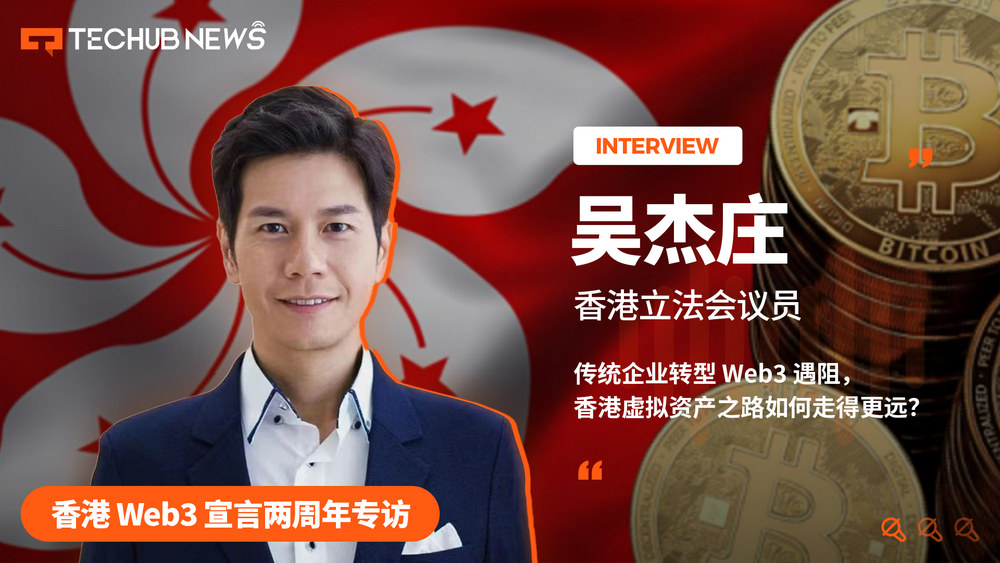整理:Glendon,Techub News
2022 年 10 月 31 日,香港正式发布虚拟资产政策宣言,标志着香港在 Web3 及虚拟资产领域迈出了坚实的一步。自那时起,香港在这一新兴领域的发展稳步前行。随着该宣言发布两周年即将到来,Techub News 对香港立法会议员吴杰庄进行了深入的独家专访,共同探讨了虚拟货币政策实施以来,对香港银行业、证券业、交易所等多个行业带来的深远影响。
吴杰庄分析了传统行业向 Web3 转型的趋势及面临的挑战。他指出,传统产业向 Web3 行业的转型已成为一个明显的发展趋势。然而,转型之路并非坦途,传统行业需要克服人才短缺、技术壁垒以及监管适应性等多重难题。
在谈到「香港虚拟资产 ETF」时,吴杰庄坦言,这一产品交易量低迷的根源在于缺乏竞争力。具体而言,香港虚拟资产 ETF 面临着来自海外同类产品的激烈竞争,价格优势并不明显;同时,客户可以直接购买虚拟货币,使得 ETF 产品的必要性受到了削弱;参与 ETF 交易的券商多为中小型机构,缺乏大型机构的客户号召力;香港虚拟资产市场功能相对单一。并且,香港散户对虚拟资产产品的投资热情也相对较低,与亚洲其他国家相比存在明显差距。对此,他提议监管机构应该适度放宽机构参与市场的一些限制,包括丰富产品种类和创新交易模式等。
此外,吴杰庄进一步展望了香港政府在 Web3 产业未来布局的关键点以及虚拟资产生态的发展趋势。他强调,香港政府要适时调整策略,不再单纯强化监管力度,而是应当从多个角度适度放宽对 Web3 及虚拟资产行业的限制,以在监管与市场发展间寻求合理平衡。

以下为采访实录,略有调整:
Techub News:香港 Web3 宣言实施两年来,虚拟资产政策具体影响了香港哪些行业?
吴杰庄议员:主要体现在两方面,在过去两年中,可以看到大规模的加密资产 Web3 产业从海外来到香港发展的现象,在虚拟资产政策发布后的第一年里,香港便涌现了数百家新兴的 Web3 公司。时至今日,这一数字已接近 1000 家,其中不仅包括了知名交易所和基础服务提供商,还涵盖了 Web3 生态中的众多新兴企业。
除此以外,传统产业也开始逐渐转型。我们注意到一些 Web2 企业开始转向 Web3。在初期,这一转型主要体现在金融机构上,例如传统券商和资产管理公司,它们更愿意开展虚拟资产业务。但是近期,我们观察到越来越多的实体经济行业也在探索如何借助 Web3 技术为自身带来一些新的增长点。
所以说,传统产业向 Web3 行业的转型,已成为一个明显的发展趋势。尤其是港府推出了Ensemble 项目沙盒后,市场上可以看到许多传统产品寻求代币化的案例,它们期望借此将其业务拓展至整个香港乃至全球的交易场景中。
Techub News:在这个转向 Web3 的过程中,这些传统行业遇到了哪些难点和挑战?
吴杰庄议员:实际上,难点非常多。首先我们观察到香港的体量并不大,人口仅为 700 多万,在科技领域的人才相对稀缺,这使得在香港招募工程师及开发人员非常困难,并且成本也不低。这是我观察到很多企业的难点之一。
其次,传统银行及大型跨国银行对 Web3 行业持保守的态度,众多企业在采用传统金融服务时缺乏大型金融机构的支持,进而导致了那些转向 Web3 的企业在提供日常金融服务时较为困难,对其发展也造成了一定程度的制约。
Techub News:在这两年里,国外金融机构对香港虚拟资产行业是什么态度,它们是否加大了布局力度?香港本土金融机构又做了些什么?
吴杰庄议员:严格来说,发展并不迅速。我刚才提到大型跨国金融机构,大多数仍然处于观望状态,仅有少数机构展现出积极姿态,例如它们会申请稳定币牌照并参与沙盒测试。而部分跨国金融机构之所以仍处于关注的状态,是因为整个虚拟资产行业要求实施不同的 KYC(了解你的客户)和 AML(反洗钱)政策,这与它们传统的业务模式大相径庭,可能需要投入大量资金来重建整个系统。
但是,我认为这只是时间问题,随着越来越多开发者来到香港发展产品和产业,这些银行、金融机构也会看准其中的商业机会进行资金投放。而且经过两年的发展,我观察到这个市场也有了一些进步。尽管海外的传统券商目前并没有积极投入到虚拟资产 ETF 项目中,但是一些互联网券商最近几个月来已经开始参与虚拟资产交易,交易量还算不错,这表明传统的投资者也是愿意进入这个赛道的。所以,等到传统的银行、券商等大型金融服务商陆续进入这个行业,它未来的发展将会更快。
另外,香港本土金融机构,我以银行为例,香港本土银行的体量相对较小,参与的态度也不算积极。相比之下,一些新创办的虚拟资产银行更为积极,它们希望找出新的突破性业务。同样积极的还有本土券商,由于股票交易等传统业务带给它们的挑战越来越大,因此它们迫切希望找到新的增长点,而虚拟资产正好提供了一个新的发展机遇。我们看到,很多中型乃至大型本土券商已涉足该领域展开竞争。同时,一些资产管理公司也在升级虚拟资产业务,一旦获得香港合规牌照,便可为客户提供虚拟资产管理服务。
Techub News:之前您曾提到香港应该设立一个「虚拟银行」,设立「虚拟银行」可以解决哪些现有银行的痛点?
吴杰庄议员:我刚才讲到了传统银行有一套传统的体系来做反洗钱和 KYC 等功能,才能符合监管需求。实际上,它们的成本投入并不小,包括了人力和技术等多个方面。而虚拟银行,也可以说是虚拟金融银行,它专为服务虚拟资产行业而生,它会自带一套 KYC、AML 以及链上分析和数据分析的功能,既能实现服务多样化,又能完全满足监管需求,可以有效缓解一些传统银行的痛点。香港如果能提供此项服务,那么无疑将吸引更多该行业项目汇聚于此。
Techub News:今年 4 月底,香港许可了华夏香港、博时国际及嘉实国际旗下的 6 支虚拟货币 ETF 交易。然而,这些 ETF 的交易量却有些不尽人意,这是否反映了市场对虚拟资产 ETF 缺乏兴趣和信心?您认为造成这种低迷表现的主要原因有哪些?
吴杰庄议员:我认为 ETF 交易量低迷的根源在于竞争力不足,主要体现在几个方面:一是面临众多海外同类产品的竞争,价格优势不明显;二是目前客户可直接购买虚拟货币,而 ETF 作为传统券商涉足虚拟资产市场的一个桥梁,其必要性因券商能直接购买虚拟资产而减弱。比如,我们能看到一些互联网券商与持牌交易所的直接对接,进一步降低了 ETF 的吸引力,毕竟成本考量是一个非常关键的因素。
三是参与 ETF 交易的券商多为中小型,它们缺乏大型机构的客户号召力;四是香港散户对虚拟资产产品的投入热情远不及其他亚洲国家,对产品的认知、投机偏好等差异也增加了零售业务推广的难度;五是香港虚拟资产市场功能相对单一,缺乏对冲等多元化操作,这也限制了一些产品的交易量。以上各种原因的共同作用,也就导致了香港 ETF 的交易量没有达到那么大。
Techub News:未来这个市场是否会迎来转机,或者说香港针对这一板块需要做出哪些改变来提高虚拟货币 ETF 交易量?
吴杰庄议员:我主张从多个角度合理放宽对虚拟资产的监管。我认为香港最适合成为亚洲区域 Web3 与金融机构的集聚地,因为香港在金融领域的广度与深度居全亚洲之首,无论是资产管理的规模还是其他金融产品的交投,实际上都是最大的。因此,我提议监管机构应该放宽机构参与市场的一些限制,包括丰富产品种类和创新交易模式等,以此促进香港相关市场的活跃度与交易量的增长。
Techub News:在香港虚拟资产市场中,合规持牌交易所毫无疑问是重要的组成部分,相比海外交易所,现有的合规交易所具备哪些优势来吸引投资者?
吴杰庄议员:香港合规持牌交易所有两个缺点:一是成本相对较高,相较在港无牌照的交易所,它们管理费较为昂贵;二是产品种类有限,难以满足散户多样化的投资需求。
这两个是明显的痛点,但是它们换来的好处是什么?安全性。
在合规交易所,无论是散户还是机构,其资金均受到全面保护,能够确保提现无忧。相比之下,海外交易所的用户在遭遇资金等安全问题时,可能会求助无门。简单来说,就是香港合规交易所可以提供百分百的安全保障,让投资者能够安心交易,这是其核心价值所在。
此外,我们都知道,虚拟资产行业其实每隔一两年都会出现一个大的爆雷,但大家永远不知道下一个爆雷是什么?因此,香港当局高度重视投资者保护,将「风险为本」作为虚拟资产政策的首要原则,旨在保障本地及国际投资者,包括机构和散户在内的所有利益。
另一方便,合规交易所与海外交易所在定位上有所差异,可以满足不同类型投资者的不同需求。而且随着政策环境的不断优化,未来或将有更多交易所在香港获得牌照,为了提升竞争力,它们必然会积极对接目标市场。
总体而言,香港在投资者保护方面展现出了坚定的决心。当然,我建议交易所在强化安全保障的同时,也应该兼顾市场发展,推出一些产品种类与创新玩法,以丰富市场选择,从而推动整个虚拟资产行业的发展。
Techub News:一些海外交易所在香港也开展了加密业务,您认为这些交易所对香港虚拟资产市场的监管带来了哪些挑战?以去年发生的 JPEX 交易所暴雷事件为例,您如何看待香港在虚拟资产监管中的不足?
吴杰庄议员:海外交易所,我认为大致可以分为两类。首先就是 JPEX 这类交易所,它们的本质就是一个骗局,旨在诱骗投资者,所以散户对此类交易所应高度警觉。香港监管机构需要从加强虚拟资产投资教育这一方向入手,提升散户辨识不合规交易平台的能力。
另一类则是在海外持有牌照,但在香港尚未取得牌照的交易所。对于此类交易所,我认为监管部门应更加积极主动,有所作为。鉴于获取香港牌照的成本较高,这些交易所想要合规运营,需要投入大量的人力、物力及技术资源。如果它们可以为香港虚拟资产市场的健康发展贡献力量并提供保护,那么监管机构也应该保护好它们的利益。
同时,监管机构需采取多种措施,确保香港的投资者,无论是机构还是散户,不会轻易将资金投向未在香港取得牌照的交易所。如前所述,香港持牌交易所的运营成本高,而海外监管环境相对宽松,如果海外交易所能随意在香港开展业务,无疑将影响到本地持牌交易所的生存空间和利益。因此,监管部门需深入思考,并采取有效措施,以更好地应对这一挑战。
Techub News:未来香港监管机构会加强监管力度吗?香港政府会在哪些方面着重发力呢?
吴杰庄议员:我认为香港政府不应该继续加强监管,而是适度放宽对 Web3 及虚拟资产公司银行服务的限制,以在监管与市场发展间寻求合理平衡。同时,香港政府应该更加积极地打造生态,比如去年拨款 5000 万港元用于数码港的生态建设,就是迈出了非常好的第一步。
接下来,我们需要做很多工作,港府应该吸引更多生态项目落户香港,比如通过举办大型活动来达成这一目标。当然,在这方面,香港也取得一些进展:明年 2 月,Consensus 大会将会在香港举行,届时我相信会吸引很多国外项目参与者来到香港;此外,香港 Web3 嘉年华也已经定档明年 4 月。因此,我希望香港政府能与数码港或是其他政府机构深化合作,加大力度引入更多的大型活动和项目,从而吸引更多人才一起建设香港 Web3 生态。
另一个重点是人才问题。比如在签证方面,对于 Web3 行业的人才,能否提供绿色通道,或者为工程师提供更好的发展空间等。我们需要思考如何吸引年轻人,因为有了人才,然后有了资金和项目,加上好的政策,自然会带来一个非常好的经济效益。至于交易所、金融机构等,我就不赘述了。但我的建议是,政府应该先给机构和散户加强虚拟资产投资的教育。我们需要在香港各行各业中,加大力度推广虚拟资产行业宣传,让他们了解这个行业的本质,并清晰认识到其中的机遇和风险。如果香港民众对于虚拟资产的认知水平能够与日韩等其他亚洲国家靠拢,那么香港加密行业将会变得更有深度和广度。
Techub News:香港计划成为世界 Web3 中心,与新加坡、日本和美国等国家的政策相比,香港特区的虚拟资产监管政策的独特之处在哪里?它在哪些方面还需要改进,以更好地适应市场需求和监管要求?
吴杰庄议员:我认为香港的监管体系已经相当健全,涵盖了持牌的虚拟资产交易所、金融服务提供商,以及稳定币监管的发牌记录等。须知虚拟资产行业已经历经了十多年的发展,该行业几乎每年都会遇到一些大问题,例如交易所盗用客户资产投资致损、企业破产及黑客攻击等重大事件。在这个发展过程中,港府也汲取了丰富的经验,在我们的严格监管下,此类问题再现的概率极低。同时,香港还引入了保险公司保障,全面保证客户资产安全、强化网络安全监管及其他关键环节,以确保已挂牌机构不会重蹈覆辙。这可以说是香港在监管上拥有的独特优势。
值得一提的是,今年 8 月,全球首例涉及中心化自治组织(DAO)的诉讼案在香港高等法院成功审理。这些实例充分证明了香港在监管和处理 Web3 各领域事务上的能力,有效消除了投资者的顾虑。同时,这也意味着香港比较容易吸引到全世界合规、有经济发展的项目来港发展。而在地理位置方面,香港实际上是亚洲的中心,我们并未想着要取代美国或其他发达国家,但是至少在亚洲,除了作为金融中心外,香港也很有可能成为真正的 Web3 中心。
Techub News:最后,您如何看待香港虚拟资产生态的未来发展趋势?这种变化对香港金融体系的稳定和发展有何影响?
吴杰庄议员:虚拟资产的范围非常广泛,以稳定币为例,香港正在着手对其进行立法规范。我们知道稳定币不仅是加密世界中的交易和投资工具,更在全球百年未有的大变局中,展现出了作为跨境贸易新型支付手段的巨大潜力。在遵循合法合规的监管框架下,香港很有可能发行一种稳定币,作为创新的支付工具,去引领支付方式的革新。
如果这个可能性出现,香港将能广泛运用稳定币于投资、贸易、支付等诸多场景,并与诸多创新项目达成合作,我相信这将为香港的各行各业催生出更多的商机。此外,虚拟资产生态的蓬勃发展,也将对香港金融体系产生积极影响,促进新兴产业与传统金融市场互补发展,进而巩固香港在金融领域的地位,赋予其更强的生命力与广阔的发展潜力。






